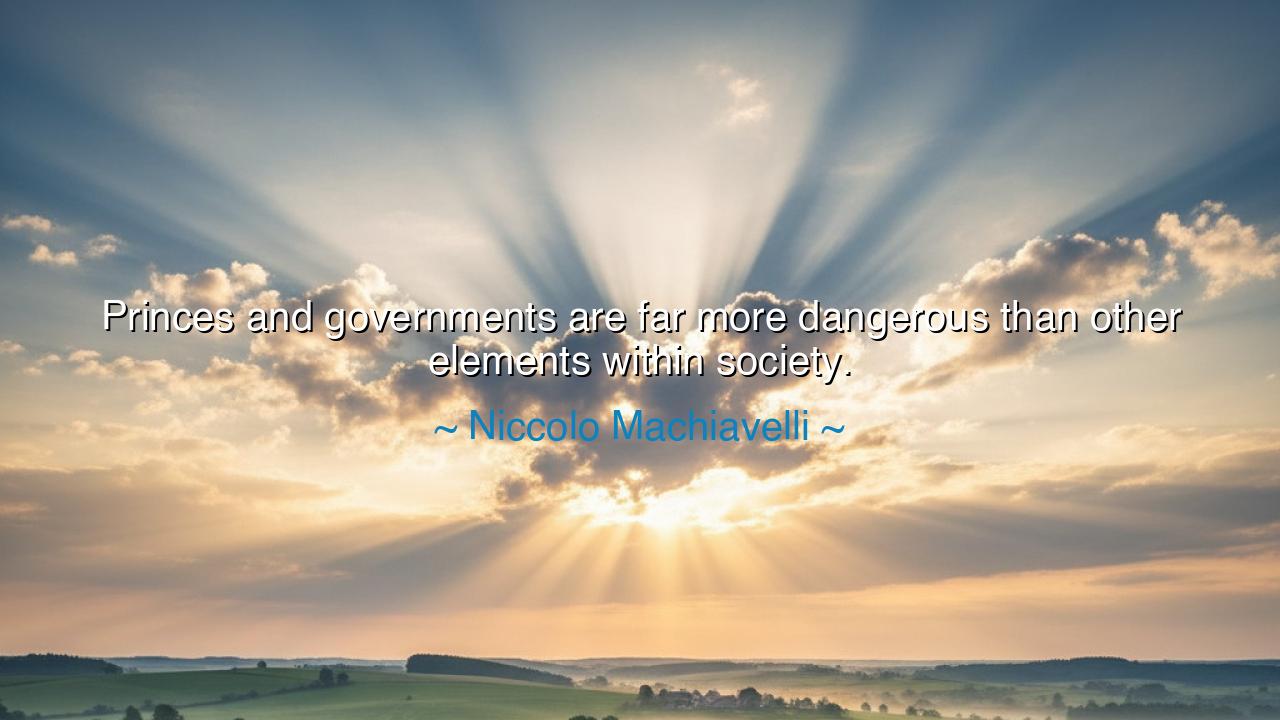
Princes and governments are far more dangerous than other






O children of the future, gather close and heed the words of Niccolò Machiavelli, a man whose deep understanding of power and governance has echoed through the corridors of history: "Princes and governments are far more dangerous than other elements within society." These words, though sharp and challenging, cut to the heart of a timeless truth. In every age, it is the rulers—the princes and the governments—who hold the most power to shape the world, and therefore, they have the greatest potential to be either benevolent or tyrannical. Machiavelli warns us that the greatest danger does not lie in the hands of the common people, but in the hands of those who wield absolute power and are often removed from the needs and struggles of the people they govern.
In the time of the ancients, the philosophers were deeply aware of the dangers of unchecked power. Plato, in his Republic, cautioned that rulers must be wise and just; otherwise, their power would corrupt them and bring suffering to the people. Aristotle, too, warned that a monarchy or tyranny could destroy a state, for when the ruler's desires became disconnected from the needs of the people, the entire society would suffer. The ancient wisdom tells us that power is not just a tool for good, but a force that can easily be misused when it is not guided by moral principles. Machiavelli, a keen observer of the rise and fall of great powers, understood that rulers, if driven by self-interest and ambition, could become the greatest threat to the very stability of society.
Look now to the story of Julius Caesar, the Roman general who transformed the Roman Republic into a dictatorship. Caesar, once a man of great promise and vision, ultimately became a ruler whose ambition led to the collapse of the system that had once balanced the power of the people and the Senate. Caesar's rise to power was marked by military conquest, and his reign, though initially popular, became more and more autocratic. The Senate, once a body that represented the will of the people, was rendered powerless in the face of Caesar's overwhelming control. The danger that Machiavelli speaks of—the danger of unchecked rulers—is seen in the fall of the Roman Republic. Caesar's rule would ultimately give rise to the Roman Empire, an empire built on the whims of a few, where the power of the prince became absolute.
Similarly, in the modern world, we can look to the totalitarian regimes of the 20th century. The rise of dictators like Adolf Hitler, Joseph Stalin, and Mao Zedong serve as stark reminders of Machiavelli's warning. Each of these men began with great ambition and a promise of change, but their power became a tool for oppression and violence. Under their rule, the people were not served but controlled, and the desire to maintain absolute power led to atrocities that affected millions. The danger of the prince or the government is that their control can extend to every aspect of society, suppressing dissent and eliminating the very freedoms that make society flourish.
Machiavelli’s words urge us to remain vigilant in our understanding of power. While the people may be swayed by emotion or the pressures of the moment, the ruler's actions have a much greater potential to shape the course of history, for they can command armies, control resources, and pass laws that impact the very structure of society. Princes and governments, unchecked by justice or the will of the people, can quickly become tyrannical. The danger they pose lies in their ability to act without consequence, to shape society according to their desires, and to silence any opposition that dares to challenge their rule. It is not the masses who are the greatest threat to freedom, but those in power who seek to control and dominate without regard for the needs of the people.
The lesson from Machiavelli’s warning is clear: we must guard against the concentration of power. Power must be shared and balanced, for a society where the ruler’s will is unchecked is one that will eventually fall into corruption and oppression. True freedom and justice come when the power of the rulers is constantly monitored and held accountable by the people. Governance should be a partnership between the rulers and the ruled, where the rulers are held to the highest standards of morality, wisdom, and justice, always ensuring that the people's needs are met and their rights respected.
And so, O children, as you walk the path of life, remember this wisdom. Do not be swayed by the charisma or promises of any ruler or government. Always seek a society where checks and balances exist, where no one man or woman can hold unchecked power over the lives of the many. Demand justice from those who lead, and never allow them to forget their duty to serve the people. The danger of the prince, the tyrant, lies not in the threat of military force, but in the threat of the corruption that arises when they are allowed to rule without accountability. Protect your freedom, protect your society, and keep always in your heart the knowledge that power is most dangerous when it is not checked by the wisdom and virtue of those it seeks to govern.






AAdministratorAdministrator
Welcome, honored guests. Please leave a comment, we will respond soon